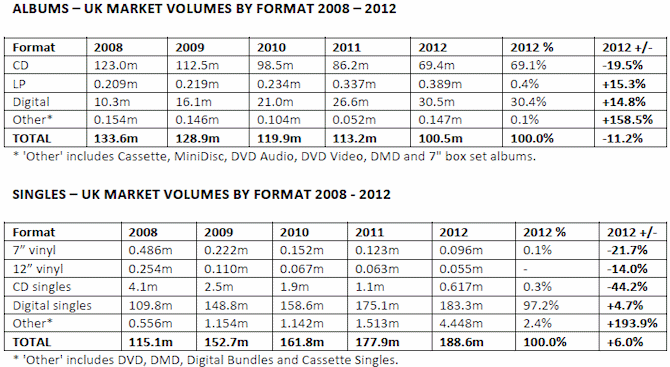UK Digital Music Sales Soar Despite Threat from ISP Internet Piracy
The British Phonographic Industry (BPI), which claims to represent the United Kingdom’s music industry, has once again reported “strong growth” from digital music sales during 2012 (e.g. digital album sales were up 14.8% to 30.5m) and that’s despite the perceived threat from internet piracy by broadband ISP consumers.
It’s interesting to note that this year’s annual report makes no mention of piracy (copyright infringement), which is in stark contrast to last year when the BPI’s CEO, Geoff Taylor, warned that the government was taking “too long to act on piracy” and risked “weakening copyright to the benefit of US tech giants“.
Advertisement
Geoff Taylor, Chief Executive of the BPI, said:
“2012 was an encouraging year for UK artists and for music’s digital future. Digital albums grew strongly and singles sales hit a new record. Music fans are now streaming billions of songs from new services enabled by record labels.
However, the quality of our music and digital innovation by UK labels means we have excellent potential for domestic growth and to increase our share of the global music market. We hope Government will recognise the potential of digital music to contribute to economic recovery and provide more active support in 2013.”
It should however be said that traditional physical music CD sales have continued to decline, although this is often caused by the fact that digital music allows consumers to pick and choose what tracks they like from an album (i.e. ignoring the rubbish). Not to mention the still dire economic conditions and the fact that the CD as a medium is gradually disappearing.

The music industry also spent much of 2012 putting pressure on broadband providers to block (censor) access to popular internet piracy websites, such as The Pirate Bay. Curiously this doesn’t appear to have had much of an impact on the organic growth of digital music during 2012, although it’s still early days.
Elsewhere the much delayed Digital Economy Act (DEA), which controversially seeks to warn and ultimately punish (e.g. disconnect) ISP customers whom are “suspected” of involvement with internet copyright infringement, won’t even begin to send its first warning letters until early 2014.
The BPI hopes that this, combined with potentially tougher “technical measures” in the future (e.g. the widely disliked idea of temporary service disconnection), should give the UK music industry a boost. But critics still question such expectations (i.e. somebody who downloads 500 music tracks for “free” may never have brought that many in the first place).
Advertisement
Mark is a professional technology writer, IT consultant and computer engineer from Dorset (England), he also founded ISPreview in 1999 and enjoys analysing the latest telecoms and broadband developments. Find me on X (Twitter), Mastodon, Facebook, BlueSky, Threads.net and Linkedin.
« Survey Finds Rising Broadband ISP Satisfaction But Many Still Unhappy

















































Comments are closed